Hey there, dog lovers! Can German Shepherds Eat Rice Every Day? I’m Dr. Arif Aziz, and today I want to chat with you about something important: German Shepherds are awesome pets, right? But when it comes to their food, we want to make sure we’re doing the best for them.
Welcome to our guide on the dietary needs of German Shepherds! As loving pet owners, we all want to ensure that our furry friends are getting the best nutrition possible. One crucial aspect of caring for German Shepherds is understanding their dietary requirements and providing them with a balanced diet to support their health and well-being.
As a vet, I’m here to break it down for you. Rice can be good for German Shepherds, but we need to be careful. Let’s talk about how much rice is okay, what to watch out for, and how it can fit into your pup’s diet. Stick around as we dig into this topic together and make sure our furry friends are eating right and feeling great!

Rice is an essential food in many households, and its inclusion in dog diets is a common practice. However, the question remains: Is rice suitable for daily consumption by German Shepherds?
In this article, we delve into the benefits and considerations of feeding rice to German Shepherds every day to help pet owners make informed decisions about their dog’s diet.
Understanding the Nutritional Needs of German Shepherds:
German Shepherds are energetic and intelligent dogs known for their strength, agility, and loyalty. To keep them healthy and happy, it’s essential to meet their specific dietary requirements. Just like us, their diet should be tailored to their individual needs, taking into account factors such as age, weight, activity level, and health status.
Dietary Requirements:
- Protein: German Shepherds are active dogs with strong muscles, so they need a diet rich in high-quality protein to support muscle growth and maintenance. Look for dog foods with sources of protein like chicken, beef, or fish.
- Carbohydrates: Carbohydrates provide energy for your German Shepherd’s daily activities. While they don’t need excessive amounts, carbohydrates like rice can be a good source of energy when balanced with protein and fats.
- Fats: Healthy fats are important for your German Shepherd’s skin, coat, and overall health. Omega-3 and Omega-6 fatty acids, found in sources like fish oil, can help maintain their skin and coat health.
- Vitamins and Minerals: German Shepherds require essential vitamins and minerals for various bodily functions, including calcium for bone health and vitamins A and E for their immune system.
Importance of a Balanced Diet:
Providing a balanced diet is crucial for maintaining your German Shepherd’s overall health and well-being. Here’s why:
- Optimal Growth and Development: Puppies need a well-balanced diet to support their rapid growth and development. Nutrient-rich foods help them build strong bones, muscles, and organs.
- Healthy Weight Management: Maintaining a healthy weight is vital for preventing obesity and related health issues in German Shepherds. A balanced diet with proper portion control can help keep them at an ideal weight.
- Supporting Active Lifestyles: German Shepherds are active dogs that require sufficient energy to fuel their daily activities. A balanced diet ensures they have the energy they need to play, exercise, and explore their environment.
- Preventing Health Problems: A diet lacking in essential nutrients can lead to various health problems in German Shepherds, including skin issues, digestive problems, and weakened immune systems. A balanced diet helps prevent these issues and supports their overall health.
By understanding and meeting the nutritional needs of your German Shepherd through a balanced diet, you can help them lead a happy, healthy life full of energy and vitality.
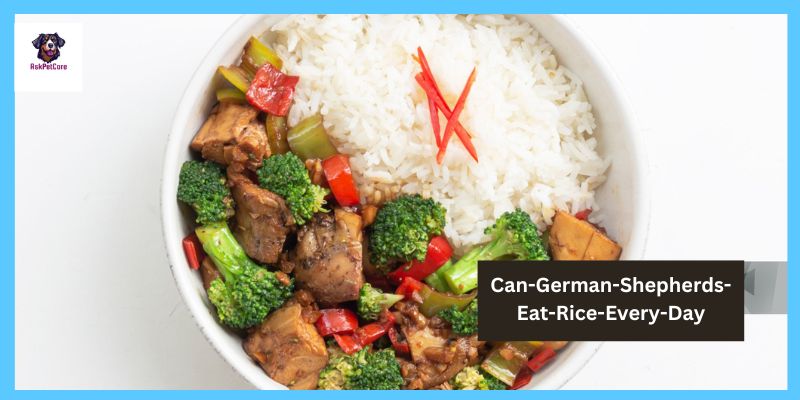
Benefits of Rice in a German Shepherd’s Diet:
Rice is a common ingredient in many dog foods, and for good reason! It offers several nutritional benefits that can contribute to your German Shepherd’s overall health and well-being.
Nutritional Benefits of Rice:
- Good Source of Carbohydrates: Carbohydrates are an essential energy source for dogs, providing the fuel they need for their daily activities. Rice is a highly digestible carbohydrate that can provide a steady release of energy to keep your German Shepherd active and energized.
- Rich in Fiber: Fiber is important for maintaining digestive health and regular bowel movements in dogs. Brown rice, in particular, contains more fiber than white rice, which can aid in digestion and help prevent constipation.
- Contains Essential Nutrients: While rice is primarily known for its carbohydrate content, it also contains essential nutrients such as vitamins and minerals. These include B vitamins like niacin and thiamine, as well as minerals like manganese and selenium, which are important for various bodily functions.
Contribution to a Well-Rounded Diet:
When served in moderation, rice can be a valuable addition to your German Shepherd’s diet, contributing to a well-rounded and balanced meal plan in the following ways:
- Energy Boost: The carbohydrates in rice provide a quick and sustained source of energy, making it ideal for active dogs like German Shepherds who need fuel for their daily adventures and activities.
- Digestive Support: The fiber content in rice can aid in digestion and promote gastrointestinal health in your German Shepherd. It can help regulate bowel movements and prevent digestive issues such as constipation or diarrhea.
- Versatility: Rice is a versatile ingredient that can be easily incorporated into your German Shepherd’s meals. Whether served cooked or mixed with other ingredients, rice can add texture and palatability to their diet, making mealtime more enjoyable.
- Suitable for Sensitive Stomachs: Rice is often recommended for dogs with sensitive stomachs or food sensitivities. Its mild flavor and gentle nature make it easy to digest and less likely to cause adverse reactions in dogs with dietary sensitivities.
By including rice in your German Shepherd’s diet in appropriate portions, you can provide them with a nutritious and balanced meal that supports their overall health and vitality. Just remember to monitor their intake and adjust their diet as needed based on their individual nutritional requirements and preferences.

Risks and Considerations:
While rice can offer numerous benefits to German Shepherds, it’s essential to be aware of potential risks and considerations associated with incorporating it into their diet.
- Allergies and Sensitivities:
- Potential Allergen: While rare, some dogs may develop allergies or sensitivities to rice. Signs of an allergic reaction can include itching, skin rashes, gastrointestinal upset, or ear infections. If you notice any of these symptoms after introducing rice into your German Shepherd’s diet, consult your veterinarian for guidance.
- Digestive Issues:
- Digestive Upset: Introducing new foods, including rice, can sometimes lead to digestive upset in dogs. Symptoms may include diarrhea, vomiting, flatulence, or abdominal discomfort. To minimize the risk of digestive issues, gradually introduce rice into your German Shepherd’s diet by mixing small amounts with their regular food and gradually increasing the portion size over several days.
- Weight Management:
- Caloric Considerations: Rice is calorie-dense, so it’s essential to monitor your German Shepherd’s portion sizes to prevent overfeeding and weight gain. Too much rice in their diet without adequate exercise can contribute to obesity, which can lead to various health problems. Be mindful of portion control and consider adjusting the amount of rice based on your dog’s activity level and weight management goals.
Tips for Safe Introduction and Monitoring:
- Start Slowly: Introduce rice into your German Shepherd’s diet gradually, starting with small amounts and increasing the portion size over time. This allows their digestive system to adjust and reduces the risk of digestive upset.
- Monitor for Reactions: Keep an eye on your dog for any signs of allergic reactions or digestive issues after introducing rice into their diet. If you notice any adverse reactions, discontinue feeding rice and consult your veterinarian for further guidance.
- Balance with Other Ingredients: Rice should be just one component of your German Shepherd’s diet. Ensure their meals are well-balanced with a variety of protein sources, vegetables, and other grains (if applicable) to provide a comprehensive nutritional profile.
- Portion Control: Measure the amount of rice you feed your German Shepherd to ensure they’re receiving an appropriate portion size based on their individual calorie needs and activity level. Avoid excessive feeding to prevent weight gain and other health issues.
By taking these precautions and monitoring your German Shepherd’s response to rice, you can safely incorporate this nutritious ingredient into their diet while minimizing potential risks and ensuring their overall well-being. As always, consult with your veterinarian for personalized dietary recommendations based on your dog’s specific needs and health status.
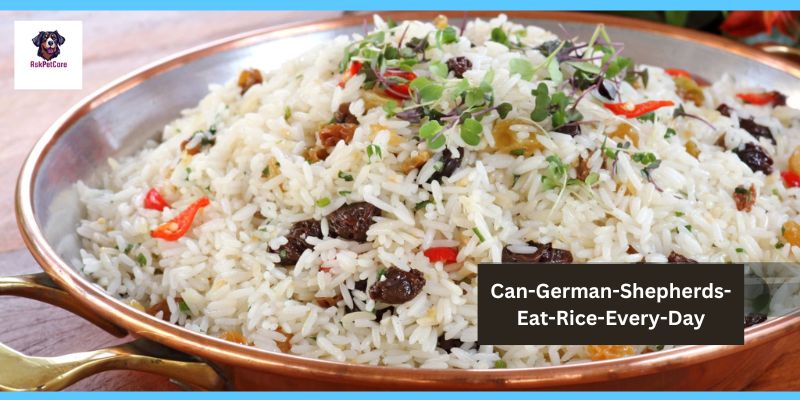
Balancing Rice with Other Food Sources:
It’s crucial to provide your German Shepherd with a well-rounded diet that includes a variety of nutrient-rich ingredients. While rice can be a valuable addition to their meals, it should be balanced with other food sources to ensure they receive all the essential nutrients they need for optimal health.
Importance of Variety:
- Nutritional Diversity: Different foods contain different nutrients, so by offering a variety of ingredients, you can ensure your German Shepherd receives a wide range of essential vitamins, minerals, and other nutrients.
- Preventing Nutritional Deficiencies: A balanced diet helps prevent nutritional deficiencies that can arise from relying too heavily on one type of food. By incorporating a variety of protein sources, vegetables, and grains (including rice), you can help meet all of your dog’s nutritional needs.
- Palatability and Enjoyment: Variety in your German Shepherd’s diet can also keep mealtime interesting and enjoyable for them. Offering a diverse range of flavors and textures can stimulate their appetite and make mealtime a positive experience.
Suggestions for Incorporating Rice:
- Homemade Meals: If you prefer to prepare homemade meals for your German Shepherd, rice can be easily incorporated into recipes. Cooked rice can serve as a base for homemade dog food, mixed with protein sources such as cooked chicken, beef, or fish, as well as vegetables like carrots, peas, and spinach. Be sure to consult a veterinarian or canine nutritionist for guidance on preparing balanced homemade meals.
- Commercial Dog Food: Many commercial dog foods contain rice as a primary or supplementary ingredient. When selecting a commercial dog food for your German Shepherd, look for high-quality options that list whole grains like brown rice as one of the main ingredients. Read the label carefully to ensure the food provides a balanced nutritional profile and meets your dog’s specific dietary needs.
- Supplements: In addition to rice and other whole food ingredients, consider incorporating supplements into your German Shepherd’s diet to provide additional nutrients and support their overall health. Omega-3 fatty acids, glucosamine, and probiotics are examples of supplements that may benefit German Shepherds. Consult with your veterinarian to determine which supplements are appropriate for your dog.
By balancing rice with other protein sources, vegetables, and supplements, you can ensure your German Shepherd receives a well-rounded and nutritious diet that supports their overall health and well-being. Experiment with different recipes and commercial dog foods to find what works best for your dog, and don’t hesitate to seek guidance from a veterinary professional for personalized dietary recommendations.
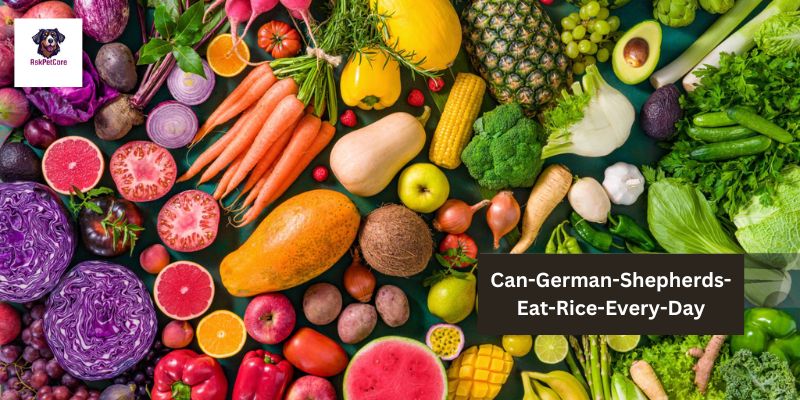
What Vegetables Can German Shepherds Eat?
German Shepherds can enjoy a variety of vegetables as part of their diet. These vegetables offer a range of essential nutrients, vitamins, and minerals that contribute to their overall health and well-being. Here are some vegetables that are safe and beneficial for German Shepherds to eat:
- Carrots: Carrots are a favorite among many dogs, including German Shepherds. They are low in calories and high in fiber, making them great for digestion. Carrots are also rich in beta-carotene, which is converted into vitamin A in the body and essential for eye health.
- Green Beans: Green beans are another excellent vegetable option for German Shepherds. They are low in calories and packed with vitamins and minerals such as vitamin C, vitamin K, and manganese. Green beans can also help your dog feel full without adding extra calories, making them a great option for weight management.
- Broccoli: Broccoli is a nutrient-dense vegetable that provides a range of health benefits for German Shepherds. It contains vitamins A, C, and K, as well as fiber and antioxidants. However, it’s essential to feed broccoli to your dog in moderation, as too much can cause digestive upset.
- Spinach: Spinach is a leafy green vegetable that is rich in vitamins and minerals, including iron, calcium, and vitamin K. It also contains antioxidants that help support your dog’s immune system. Like broccoli, spinach should be fed in moderation to avoid potential issues with oxalates.
- Sweet Potatoes: Sweet potatoes are a nutritious and delicious vegetable that many dogs enjoy. They are rich in vitamins A, C, and B6, as well as fiber and antioxidants. Sweet potatoes can be served cooked and mashed or baked as a tasty treat for your German Shepherd.
- Pumpkin: Pumpkin is an excellent source of fiber and can help regulate your dog’s digestion. It is also rich in vitamins A, C, and E, as well as potassium and iron. Serve pumpkin puree (without added sugars or spices) as an occasional treat or mix it with your dog’s food for added fiber and flavor.
- Bell Peppers: Bell peppers are rich in vitamin C and antioxidants, making them a healthy addition to your German Shepherd’s diet. They come in various colors, including red, yellow, and green, offering a range of nutrients and flavors.
- Cucumber: Cucumbers are low in calories and high in water content, making them a refreshing snack for German Shepherds, especially on hot days. They also contain vitamins K and C, as well as potassium, which supports heart health.
- Zucchini: Zucchini is a low-calorie vegetable that is rich in fiber, vitamins, and minerals. It can be served raw or cooked and is a good source of vitamin A, vitamin C, and potassium for your German Shepherd.
- Celery: Celery is a crunchy vegetable that is low in calories and high in fiber, making it a healthy snack option for German Shepherds. It also contains vitamins A, C, and K, as well as antioxidants that help support your dog’s immune system.
- Peas: Peas are a nutritious vegetable that is rich in protein, fiber, and vitamins. They provide essential nutrients such as vitamin K, vitamin C, and folate, and can be served fresh or frozen as a tasty addition to your German Shepherd’s meals.
- Brussels Sprouts: Brussels sprouts are packed with nutrients, including vitamins A, C, and K, as well as fiber and antioxidants. While some dogs may not enjoy the taste of Brussels sprouts, others may find them to be a tasty and nutritious treat.
- Cabbage: Cabbage is a cruciferous vegetable that is low in calories and high in fiber. It contains vitamins K and C, as well as antioxidants that help promote overall health and well-being in German Shepherds.
- Beets: Beets are a nutrient-dense vegetable that is rich in vitamins, minerals, and antioxidants. They contain folate, manganese, and potassium, which support various aspects of your German Shepherd’s health, including heart health and immune function.
- Asparagus: Asparagus is a source of vitamins A, C, and K, as well as folate and fiber. It can be served cooked or raw and makes a healthy addition to your German Shepherd’s diet, providing essential nutrients and promoting digestive health.
When offering vegetables to your German Shepherd, it’s important to prepare them appropriately and serve them in moderation. Introduce new vegetables gradually and monitor your dog for any adverse reactions. With a diverse selection of vegetables, you can provide your German Shepherd with a balanced and nutritious diet that supports their overall health and well-being.
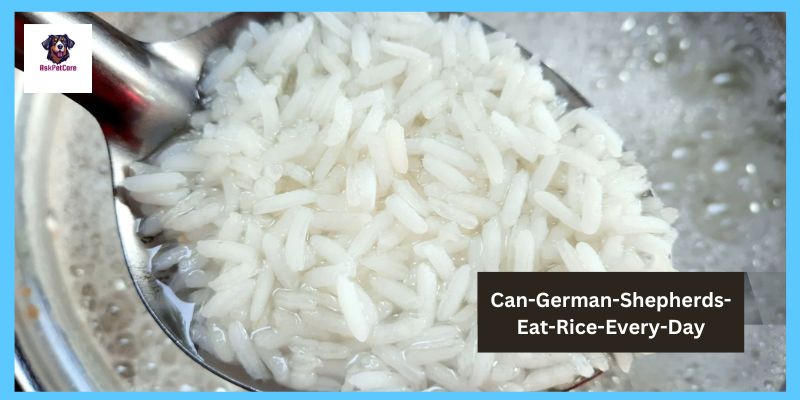
Can German Shepherds Eat Rice :
Yes, German Shepherds can eat rice. In fact, rice can be a healthy and nutritious addition to their diet when served in moderation. Rice is a good source of carbohydrates, which provide energy for your German Shepherd’s daily activities. It’s also easily digestible, making it gentle on their stomach.
However, it’s important to feed rice to your German Shepherd in appropriate portions and as part of a balanced diet. Too much rice, especially if not balanced with other nutrients, can contribute to weight gain and other health issues. Additionally, some dogs may be sensitive to grains like rice, so it’s essential to monitor your dog for any signs of digestive upset or allergic reactions after introducing rice into their diet.
If you’re considering adding rice to your German Shepherd’s meals, consult with your veterinarian to ensure it’s suitable for your dog and to determine the appropriate portion sizes based on their individual dietary needs and health status.
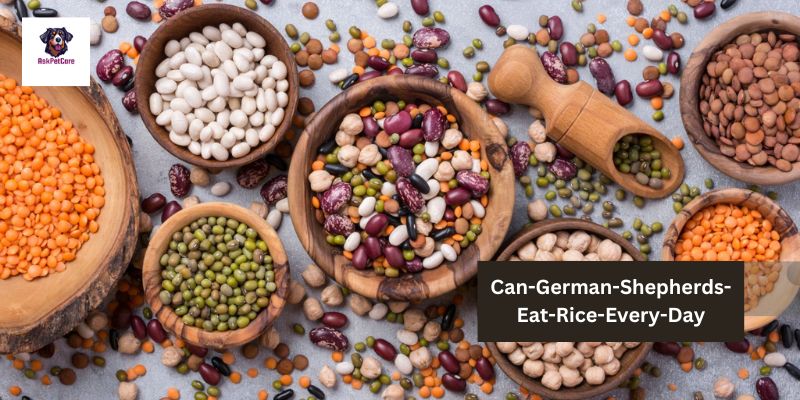
Can German Shepherds Eat Beans :
Yes, German Shepherds can eat beans, but there are a few things to keep in mind when incorporating them into their diet.
- Types of Beans: There are various types of beans, including kidney beans, black beans, pinto beans, and chickpeas (also known as garbanzo beans). These beans can be served to your German Shepherd in different ways, such as cooked or canned. However, it’s essential to avoid feeding your dog raw beans, as they contain lectins that can be harmful to dogs when consumed in large amounts.
- Nutritional Benefits: Beans are a nutritious food for dogs as they are rich in protein, fiber, vitamins, and minerals. Protein is essential for muscle growth and repair, while fiber aids in digestion and promotes bowel regularity. Additionally, beans contain vitamins like folate and minerals like iron and potassium, which are beneficial for your German Shepherd’s overall health.
- Preparation: Before feeding beans to your German Shepherd, it’s important to cook them thoroughly. Cooking helps break down the complex carbohydrates in beans, making them easier for your dog to digest and reducing the risk of digestive upset. Canned beans can be a convenient option, but be sure to rinse them thoroughly to remove excess sodium and potential preservatives.
- Portion Control: While beans can be a healthy addition to your German Shepherd’s diet, they should be fed in moderation. Too many beans can cause gastrointestinal issues such as gas, bloating, or diarrhea, especially if your dog is not used to eating them. Start with small amounts of beans and monitor your dog’s response before gradually increasing the portion size.
- Variety: It’s important to offer your German Shepherd a balanced diet that includes a variety of foods, including protein sources like meat, carbohydrates like grains or vegetables, and healthy fats. Beans can be part of this balanced diet but should not be the sole source of nutrition for your dog. Mix beans with other ingredients to create nutritious meals or treats for your German Shepherd.
Overall, beans can be a healthy and nutritious addition to your German Shepherd’s diet when prepared and served appropriately. However, it’s essential to introduce them gradually and monitor your dog for any signs of digestive issues. If you have any concerns or questions about feeding beans to your German Shepherd, consult with your veterinarian for personalized advice.

Can German Shepherds Eat Eggs :
Yes, German Shepherds can eat eggs, and they can be a beneficial addition to their diet when served in moderation. Eggs are a highly nutritious food that provides a range of essential nutrients for dogs.
Here are some key points about feeding eggs to German Shepherds:
- Nutritional Benefits: Eggs are rich in protein, which is essential for building and repairing tissues in your German Shepherd’s body. They also contain healthy fats, vitamins (such as vitamin A, vitamin D, and vitamin B12), and minerals (such as iron and selenium), all of which contribute to your dog’s overall health and well-being.
- Digestibility: Eggs are easily digestible for most dogs, including German Shepherds. They can be a good option for dogs with sensitive stomachs or food allergies, as they are less likely to cause digestive upset compared to other protein sources.
- Preparation: When feeding eggs to your German Shepherd, it’s important to cook them thoroughly to reduce the risk of foodborne illness from bacteria like Salmonella. Scrambled, boiled, or poached eggs are safe options for dogs. Avoid adding any seasonings or ingredients that could be harmful to your dog, such as salt, onion, or garlic.
- Portion Control: While eggs can be a nutritious addition to your German Shepherd’s diet, they should be fed in moderation. Too many eggs can lead to an imbalance in their diet or contribute to weight gain. As a general guideline, one to two eggs per week is typically sufficient for most adult German Shepherds, but you should adjust the portion size based on your dog’s size, age, activity level, and overall health.
- Monitor for Allergies: Some dogs may have allergies or sensitivities to certain foods, including eggs. If you’re feeding eggs to your German Shepherd for the first time, monitor them closely for any signs of allergic reactions, such as itching, skin rashes, vomiting, or diarrhea. If you notice any adverse reactions, discontinue feeding eggs and consult with your veterinarian.
In summary, eggs can be a healthy and nutritious addition to your German Shepherd’s diet when served appropriately. They provide valuable nutrients and can be a tasty treat for your dog. Just remember to cook the eggs thoroughly, feed them in moderation, and monitor your dog for any adverse reactions. If you have any concerns or questions about feeding eggs to your German Shepherd, consult with your veterinarian for personalized advice.

Can German Shepherds Eat Chicken :
Yes, German Shepherds can safely eat chicken as part of their balanced diet. Chicken is an excellent source of high-quality protein, which is essential for maintaining muscle mass, supporting immune function, and promoting overall health in German Shepherds. Additionally, chicken is rich in nutrients such as vitamins B6 and B12, niacin, and zinc, which are important for your dog’s energy levels, metabolism, and coat health. However, it’s important to ensure that the chicken is cooked thoroughly to reduce the risk of foodborne illness from bacteria like Salmonella. Avoid feeding your German Shepherd chicken bones, as they can splinter and cause digestive issues or injury.
When feeding chicken to your German Shepherd, it’s essential to consider portion control and balance it with other food sources to provide a well-rounded diet. Chicken should be served without any seasoning or added ingredients that could be harmful to your dog, such as onions, garlic, or excessive salt. Aim to incorporate chicken into your dog’s meals in appropriate amounts based on their size, age, activity level, and individual dietary needs. If you have any concerns about feeding chicken to your German Shepherd or need guidance on portion sizes and dietary balance, consult with your veterinarian for personalized advice tailored to your dog’s specific health and nutritional requirements.

Can German Shepherds Eat Sweet Potatoes :
Yes, German Shepherds can safely eat sweet potatoes as part of their balanced diet. Sweet potatoes are a nutritious and healthy carbohydrate source for dogs, providing essential nutrients such as vitamins A, B6, and C, as well as fiber and potassium. These nutrients support your German Shepherd’s overall health, including their immune system, vision, and digestive health. Additionally, sweet potatoes have a low glycemic index, which means they cause a slower and steadier increase in blood sugar levels compared to other carbohydrate sources, making them suitable for dogs with diabetes or those prone to weight gain.
When feeding sweet potatoes to your German Shepherd, it’s important to prepare them properly and serve them in moderation. Sweet potatoes should be cooked thoroughly to make them easier for your dog to digest and to avoid any potential gastrointestinal upset. Avoid adding any seasonings, spices, or toppings that could be harmful to your dog, such as salt, butter, or marshmallows. Instead, offer plain cooked sweet potatoes as a healthy treat or incorporate them into your dog’s meals as a nutritious ingredient. As with any new food introduction, monitor your German Shepherd for any signs of digestive issues or allergic reactions, and consult with your veterinarian if you have any concerns or questions about feeding sweet potatoes to your dog.
Can Dogs Eat Rice Every Day :
As a veterinarian, I generally advise against feeding dogs rice as their sole food source every day. While rice can be a safe and digestible carbohydrate for dogs, relying solely on rice may not provide the balanced nutrition that dogs need to thrive. Dogs require a diverse diet that includes a variety of nutrients from different food sources, including protein, fat, vitamins, and minerals. Feeding rice exclusively may lead to nutritional deficiencies over time, as it lacks many essential nutrients that dogs require for optimal health, such as certain amino acids, vitamins, and minerals. Additionally, excessive consumption of rice can contribute to weight gain and other health issues in dogs, particularly if not properly portioned and balanced with other foods.
Instead, I recommend incorporating rice into your dog’s diet as part of a balanced and varied meal plan. Rice can be included occasionally as a source of carbohydrates, alongside protein sources such as meat, fish, or eggs, and vegetables. This ensures that your dog receives a wide range of nutrients to support their overall health and well-being. However, it’s important to monitor your dog’s weight, digestion, and overall health when feeding rice or any other food regularly, and consult with your veterinarian for personalized dietary advice tailored to your dog’s specific needs and lifestyle.
The Benefits of Can German Shepherds Eat Rice Every Day:
Rice offers several advantages for German Shepherds:
Easily Digestible:
Rice is gentle on the stomach and easily digestible, making it suitable for dogs with sensitive digestive systems.
Provides Energy:
As a source of carbohydrates, rice provides sustained energy for active German Shepherds, supporting their daily activities and exercise.
Gluten-Free Option:
Brown rice, in particular, is gluten-free, making it suitable for German Shepherds with gluten allergies or sensitivities.
Concerns for Can German Shepherds eat rice every day?
While rice offers benefits, pet owners should consider the following factors:
Nutritional Balance
Rice should be part of a balanced diet that includes proteins, vegetables, and other nutrients to meet the dog’s dietary requirements.
Moderation Feeding
Rice in moderation is essential to prevent overconsumption and potential health issues such as obesity.
Allergic Reactions
Some German Shepherds may be allergic to rice, so it’s crucial to monitor for adverse reactions such as itching, skin irritations, or digestive upset.

Alternatives to Rice in German Shepherd Diets:
Pet owners can explore alternative grains, protein sources, and vegetables to diversify their German Shepherd’s diet:
- Alternative Grains: Oats, barley, and quinoa can serve as substitutes for rice in the dog’s meals.
- Protein Sources: Incorporating diverse proteins like chicken, beef, and fish provides essential amino acids for muscle health and repair.
- Vegetable Options: Sweet potatoes, carrots, and green beans offer vitamins, minerals, and fiber to support overall health.
Consultation with a Veterinarian:
Before making significant changes to a German Shepherd’s diet, pet owners should seek guidance from a veterinarian:
- Veterinary Guidance: Veterinarians can provide personalized dietary recommendations based on the dog’s age, weight, activity level, and health status.
- Regular Check-ups: Regular veterinary check-ups ensure that the dog’s nutritional needs are met and any health concerns are addressed promptly.
Feeding rice to German Shepherds every day can offer benefits such as easy digestibility, energy provision, and gluten-free options. However, pet owners should consider nutritional balance, moderation, and potential allergic reactions when incorporating rice into their dog’s diet. Consulting with a veterinarian and exploring alternative grains, proteins, and vegetables can help ensure optimal health and well-being for German Shepherds. By understanding the pros and cons of feeding rice every day, pet owners can make informed decisions about their dog’s nutrition and overall wellness.
Excessive Carbohydrate Intake:
Overfeeding rice can contribute to excessive carbohydrate intake, potentially leading to
-
- Weight gain and obesity: This can strain joints and increase the risk of related health issues.
- Digestive problems: Excessive starch can cause bloating, gas, and even diarrhea.
- Blood sugar fluctuations: In some cases, it might contribute to diabetes risks.
If you want to learn more about German shepherds, click below.
- At-What-Age-Does-Megaesophagus-Start-In-Dogs
- German-shepherd-feeding-chart-by-age
- How-Fast-Do-Dog-Nails-Grow
Can German Shepherds Eat Chicken and Rice? Understanding the Benefits and Considerations

The Benefits of Chicken and Rice for German Shepherds:
German Shepherds can derive several benefits from incorporating chicken and rice into their diet:
High-quality Protein:
Chicken is a lean protein source that provides essential amino acids necessary for muscle development and repair in active German Shepherds.
Easily Digestible Carbohydrates:
Rice serves as a gentle source of carbohydrates that is easy on the stomach and provides sustained energy for the dog’s daily activities.
Balanced Nutrition:
The combination of chicken and rice offers a balanced meal that can meet the nutritional needs of German Shepherds, providing essential vitamins, minerals, and nutrients.
Conclusion
Feeding chicken and rice can be a nutritious and wholesome option for German Shepherds, offering high-quality protein, easily digestible carbohydrates, and balanced nutrition. However, pet owners should consider potential allergic reactions, ensure nutritional balance, practice portion control, and seek veterinary guidance to ensure the optimal health and well-being of their German Shepherd companions
With years of experience and a passion for promoting pet health, I’m committed to providing you with accurate information and valuable insights to help you make informed decisions about your beloved companion’s well-being. Feel free to contact me anytime, and together, we’ll ensure that your German Shepherd enjoys a happy, healthy, and fulfilling life!
Here are some reference books that are considered authoritative on the topic of dog care, including nail care:
- “The Complete Dog Owner’s Manual” by Dr. Bruce Fogle
- “The Ultimate Guide to Dog Care: Everything You Need to Know to Keep Your Dog Happy and Healthy” by Amy Marder and Andrew Luescher
- “The Veterinarians’ Guide to Natural Remedies for Dogs: Safe and Effective Alternative Treatments and Healing Techniques from the Nations Top by Martin Zucker
